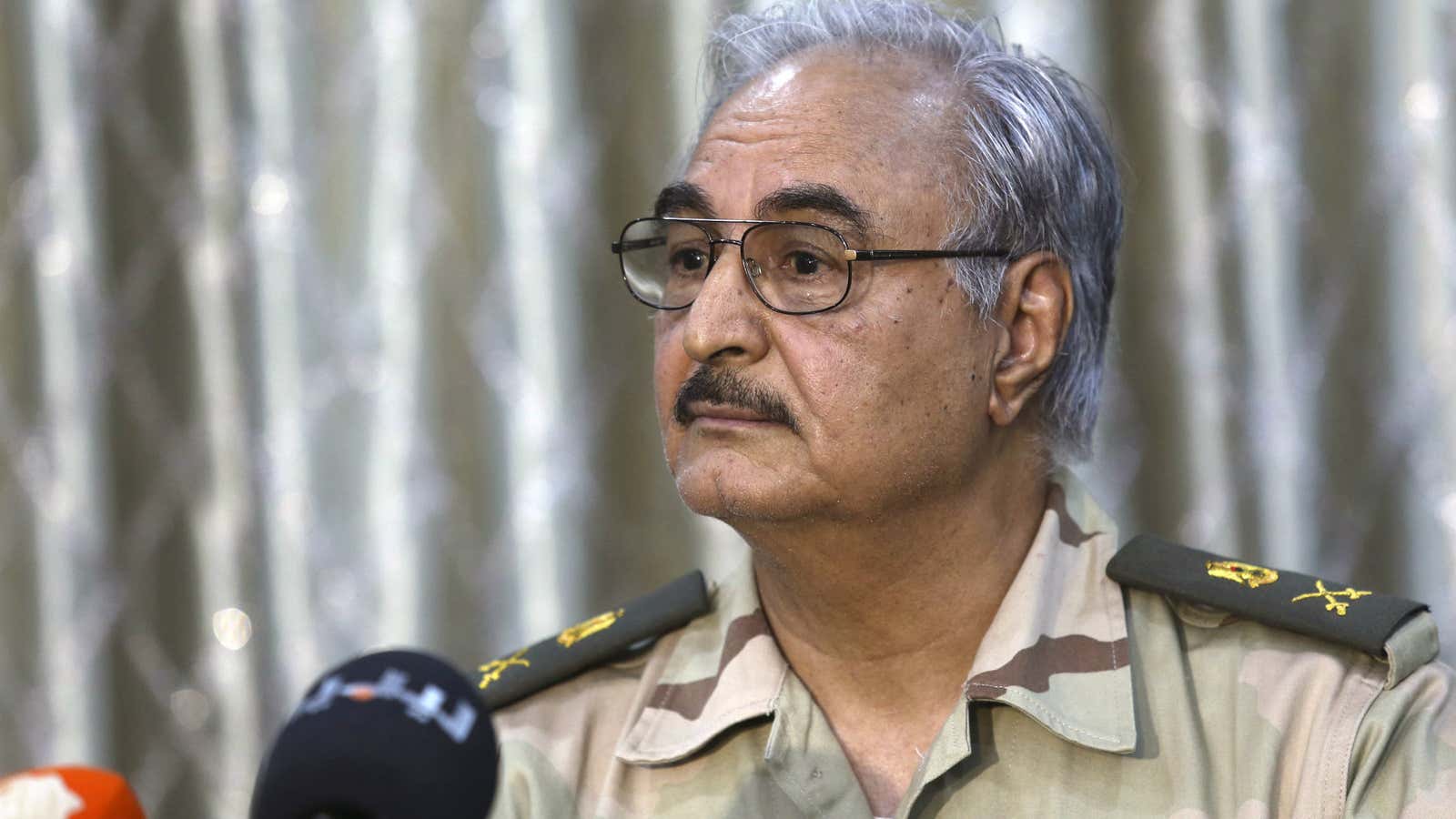Oil prices are bubbling up—benchmark crude climbed to more than $110 a barrel today, after gaining almost 2% last week. If you want to understand why, look to the strongmen-led militias in Libya and Ukraine, who are fighting for control of the political and financial spoils in their respective countries.
Trouble erupted in Libya’s two big cites
In Libya, a retired general named Khalifa Heftar (pictured above), ruling a force named after the region of Zintan, sent the capital of Tripoli into a spasm of fighting on Sunday, capturing parliament and setting it on fire. In Benghazi, Libya’s second-largest city, Heftar’s force somehow got ahold of aircraft and launched several major assaults, suggesting that at least part of the military had joined him (paywall).
Heftar claimed he is attempting to push out Islamic militias in Benghazi. He insisted he is not, as the government claims, fomenting a coup. But oil markets are spooked nonetheless.
Heftar’s actions are by far the most extended violence in Libya since Muammar Gaddafi’s fall in 2011, although militias have lorded over the main cities since then. In 2012, Benghazi-based Islamic militias associated with al Qaeda killed US ambassador Christopher Stevens. Last year, other militias took control of the country’s oil ports, essentially shutting off the flow of 1.4 million barrels of oil a day. Deals with the government in Tripoli subsequently restored about 200,000 barrels a day, but the latest violence is making future flows difficult to assure.
… which compounded existing trouble in Ukraine …
The turmoil in Libya comes on top of the crisis in Ukraine, which has entered a new phase. The feeling is that Russian president Vladimir Putin is no longer considering an invasion, and has even decided to, by and large, stop destabilizing eastern Ukraine. With the coast now clear, Ukrainian oligarchs Rinat Akhmetov and Igor Kolomoisky have taken up arms against the pro-Russian militias who had seized control of major cities. With Putin’s decision to ease up, the oligarchs’ intervention is an attempt to decide who will profit from Ukraine’s new political system.
As Quartz reported over the weekend, the participation of Akhmetov and Kolomoisky is a win for Kiev but also makes the shaky Ukrainian government dependent on their good will. That could in turn affect Ukraine’s contentious negotiations with Russia over natural gas: Moscow claims that Kiev owes a $3.5 billion debt as of April 1.
… and increased the oil risk premium
When traders bid up oil prices over such events, they cite something called a “geopolitical risk premium.” No one can calculate this premium with much certainty—some analysts say it’s $5-$10 a barrel, some as little as $3.50—but its presence is hard to deny.
Last week, oil consultant Fereidun Fesharaki, speaking at the Center for International and Strategic Studies in Washington, said he expects (audio) oil prices to plunge by some 25% over the next three years, to $80-$90 a barrel. But turbulence in countries like Ukraine and Libya could confound his prediction.
The trouble is that an unusually high risk premium has persisted since the 2011 Arab Spring. One reason is that an atypically high volume of oil production is idle. Before the Arab Spring, events such as civil wars and pipeline explosions were keeping about 500,000 barrels of oil a day off the market. But in recent years, the volume of idled production has persisted at more than 3 million barrels a day, which has prevented the price plunge that one would ordinarily expect given the surge of US shale oil production.




